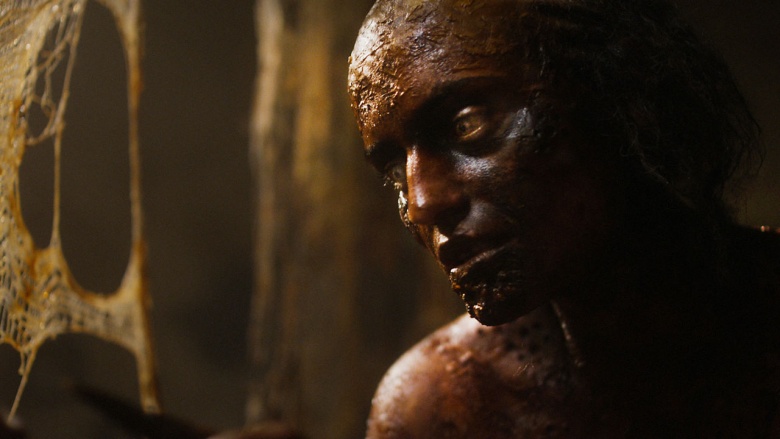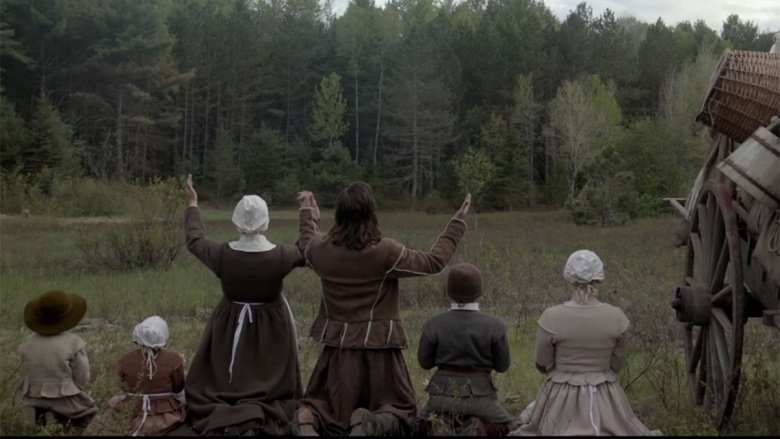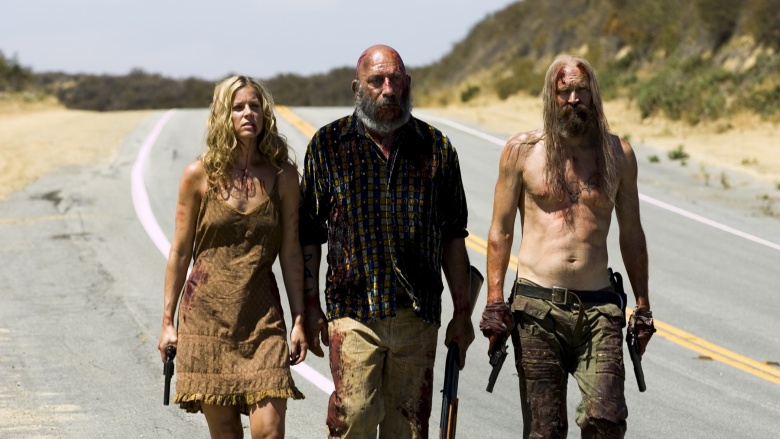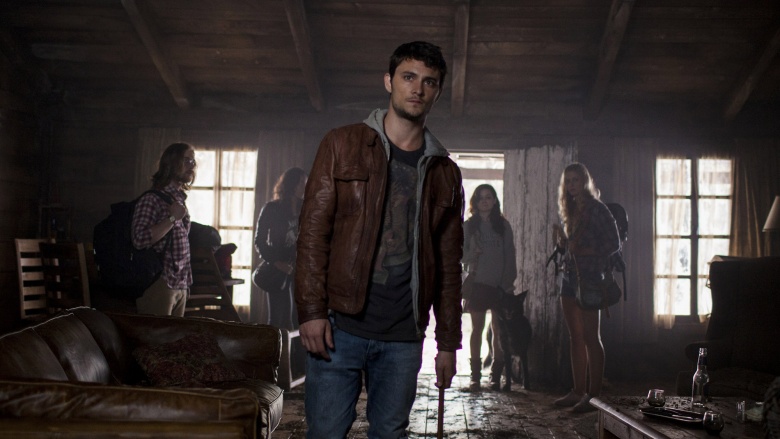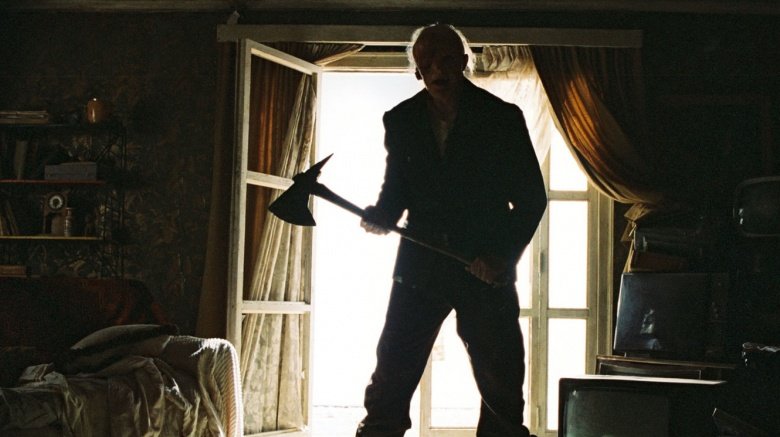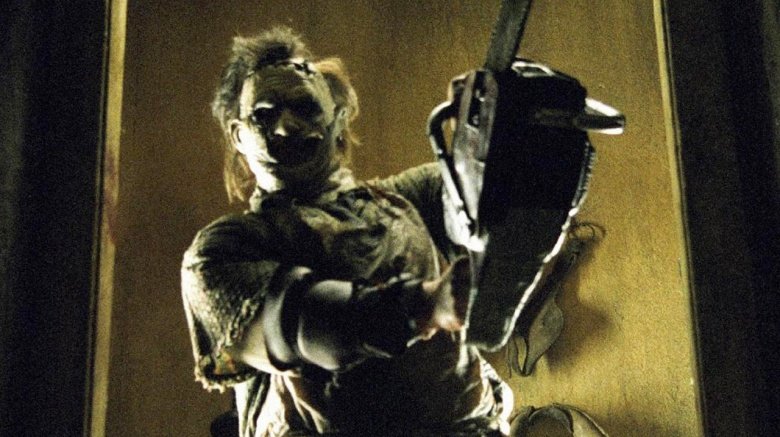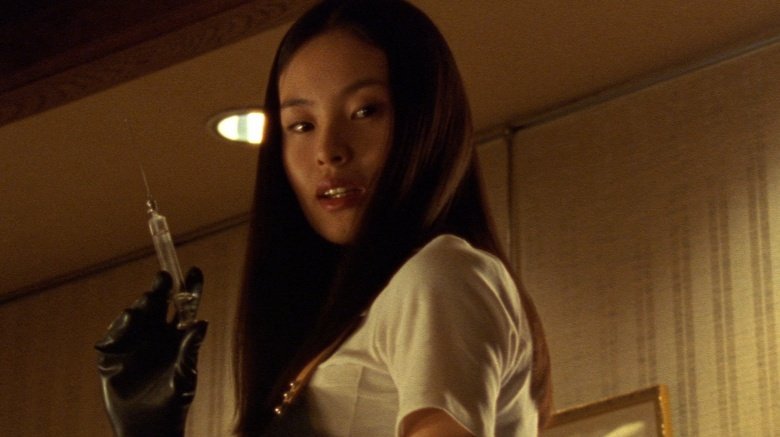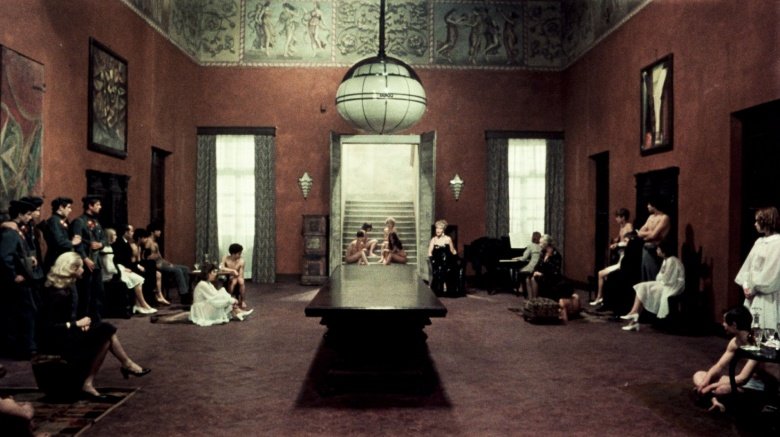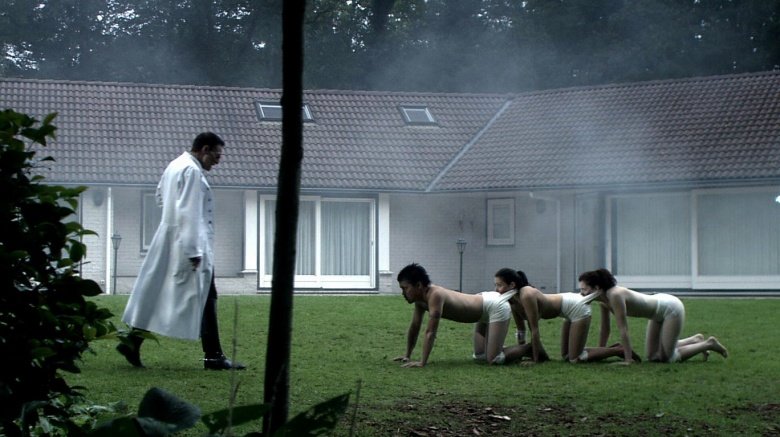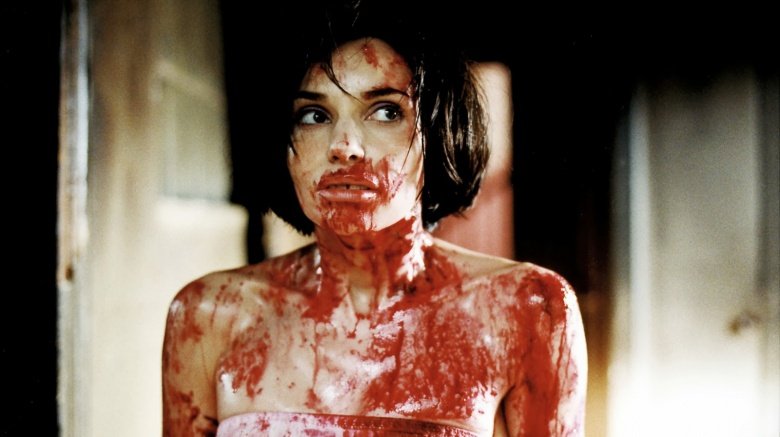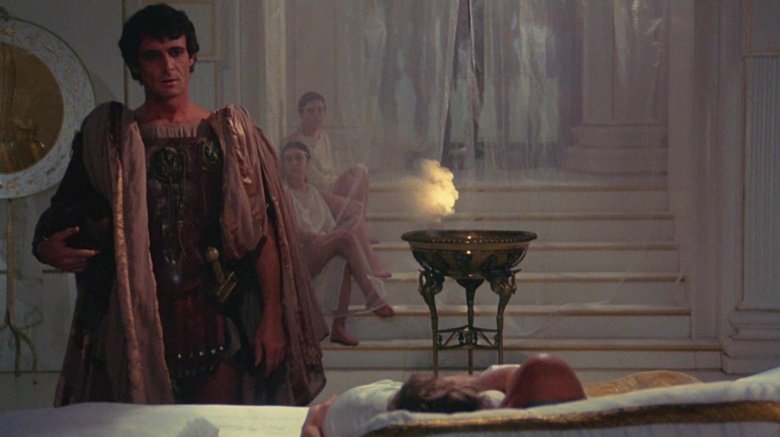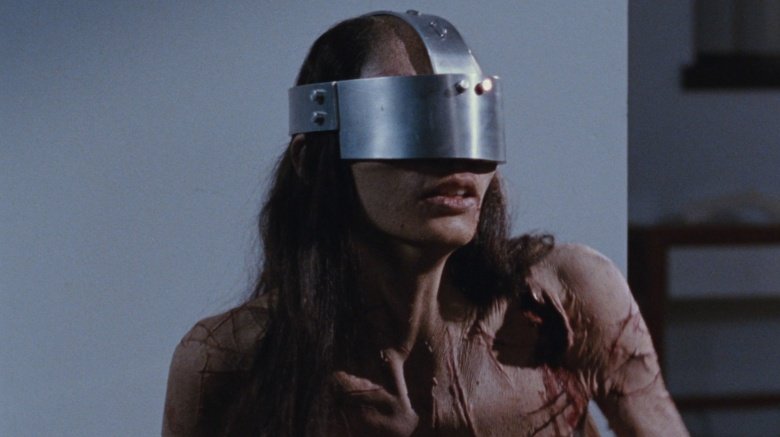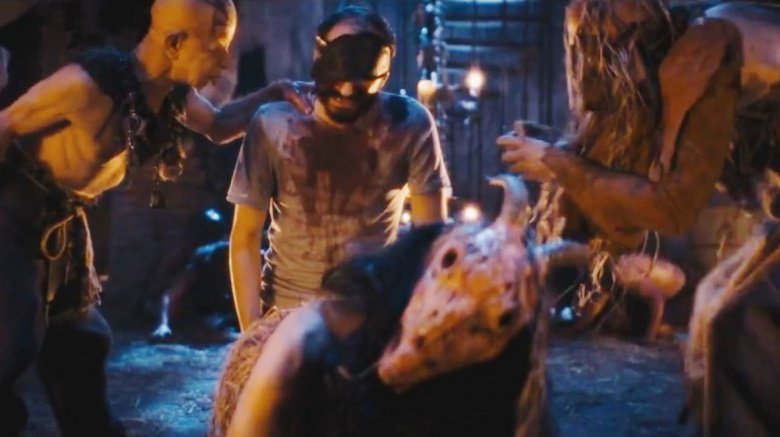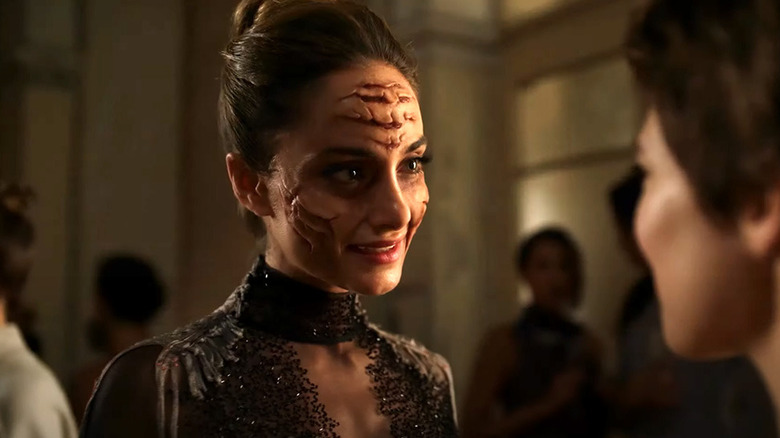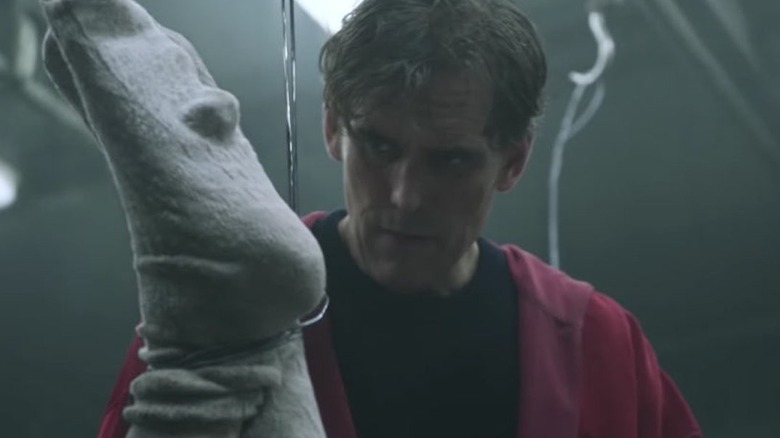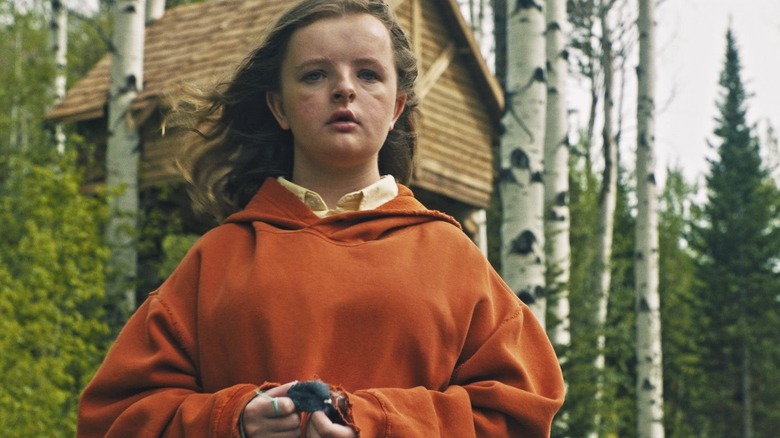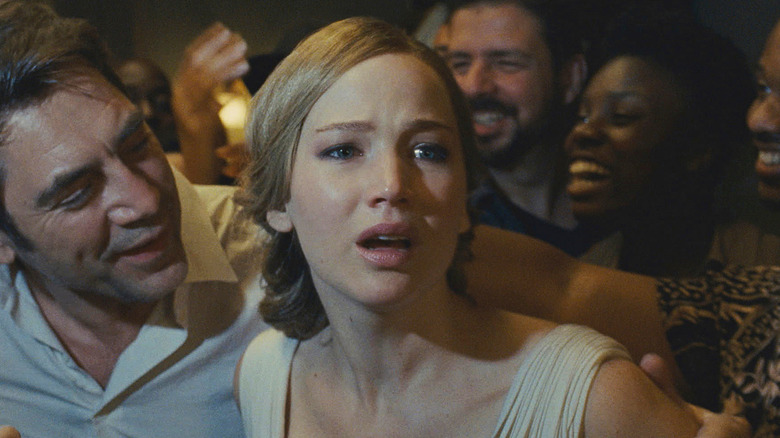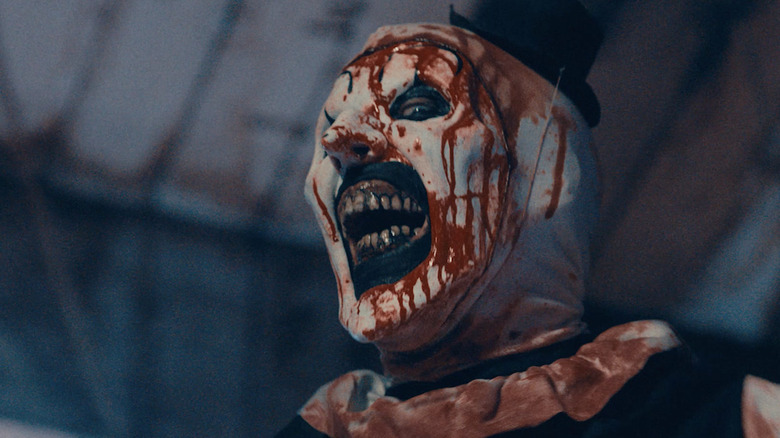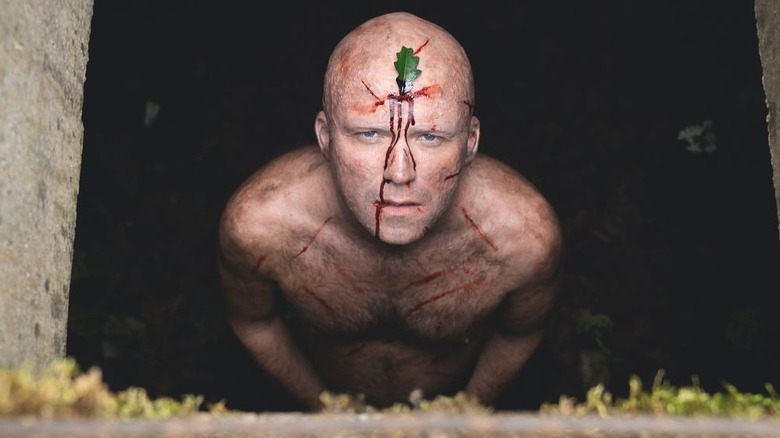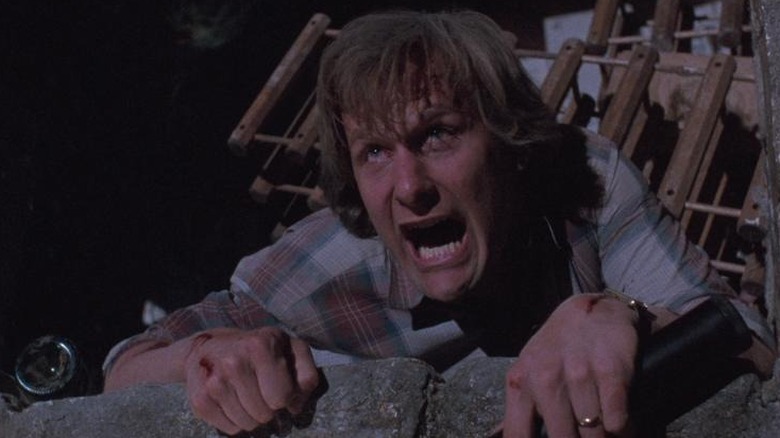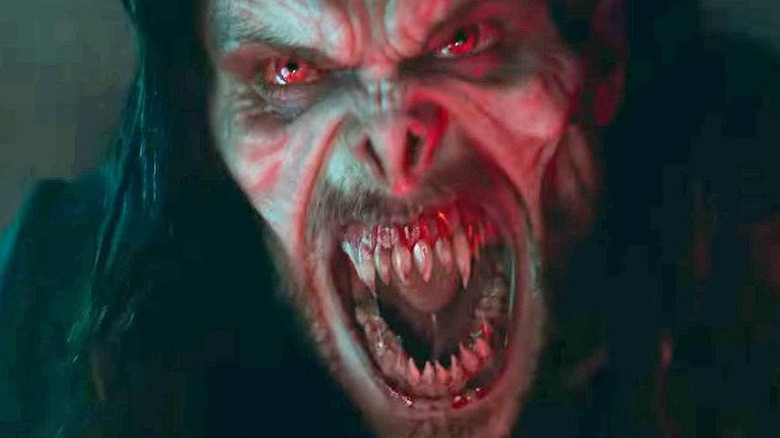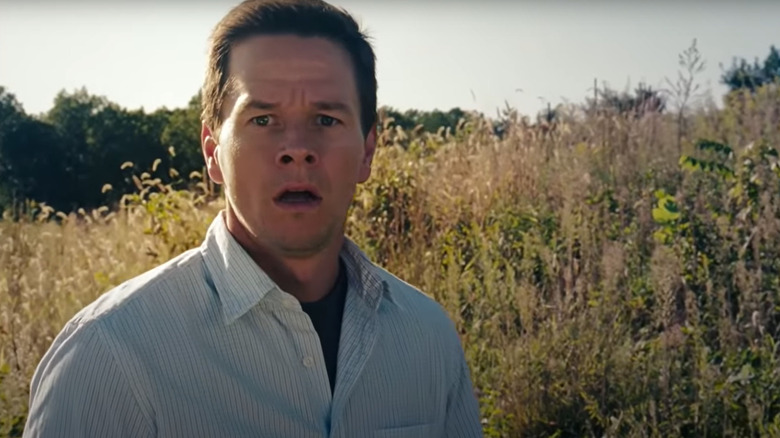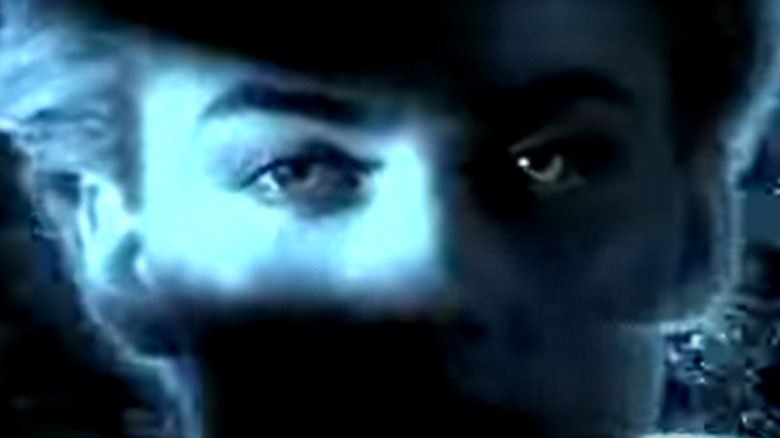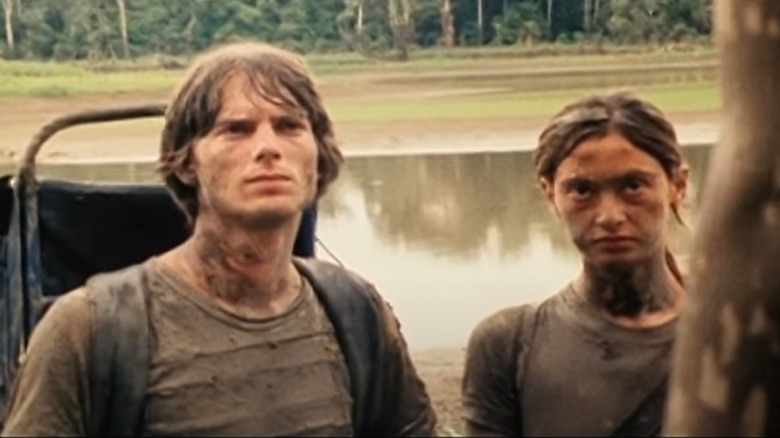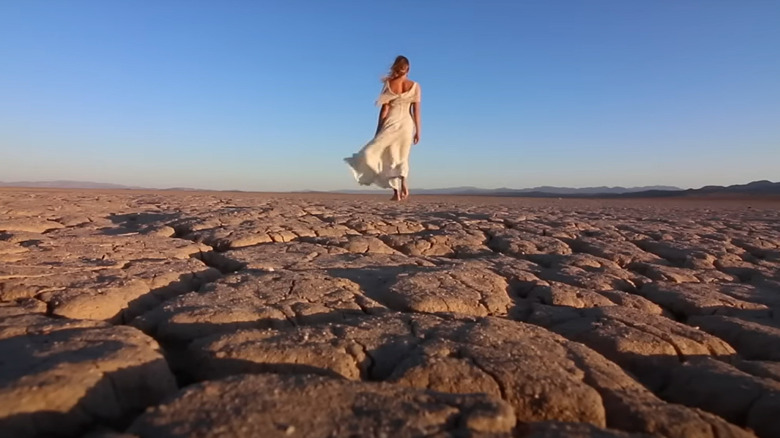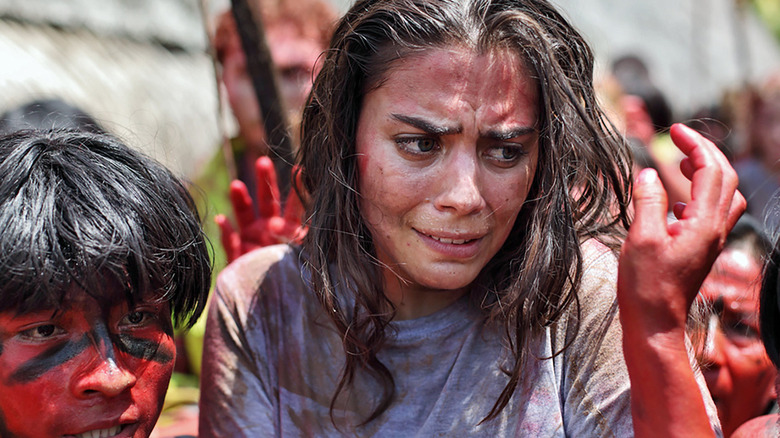Horror Movies That Audiences Walked Out Of
Even the most ardent of horror enthusiasts sometimes have to draw the line. In an age in which advancing effects technology has made it possible to depict (and grow desensitized to) incredibly realistic grossouts, there's still a limit to the amount of guts and gore audiences will watch before they have to throw in the popcorn and walk away.
Bite
This gory flick is about the effect of a bug bite gone very, very wrong on one girl, but it was the audience that really got infected when "Bite" premiered at the Fantasia International Film Festival. The pic's producers were reportedly prepared in advance for the rampant upset stomachs that would follow — they even passed out barf bags to attendees — so the early exits and people passing out weren't exactly a surprise.
For those who haven't braved the vom-inducing experience, it's about a bachelorette whose celebratory trip to Costa Rica goes way off course when she's bitten by a bug that she thinks is harmless but turns her into a murderous loon whose body slowly morphs into an insect herself. Reviewers who panned the film chided its illogical homage to David Cronenberg's "The Fly," but some still found favor in director Chad Archibald's use of gruesome screen tactics.
The Witch
Critics might have been crazy about this slow-building period pic about a 17th Century family tormented by evil, but some audiences didn't quite appreciate the drawn-out nature of the narrative, which depended less on jump scares than creepy atmosphere and a more traditional — and, for some, flat-out dull — slow-building story. Instead of being sent running by the gore, here it was the bore factor that drove audiences to the exits.
The meticulously historically accurate film by Robert Eggers was lauded by those who could sit through the duller sequences, however, as eerily paralleling some of the dark truths of the witch-hunting colonial era, particularly within the fundamentally religious patriarchal family unit set at the center of the slaughter.
Raw
Some Cannes filmgoers got much more than their eyes (or stomachs) could handle in 2016, when Julia Ducournau's "Raw" presented them with the story of a young vegetarian woman who was hazed into eating raw meat during school — an act of bullying that awakened a dormant flesh fetish sickening enough to send audiences rushing for the exit signs.
Trade reviewers of the pic, however, were impressed by Ducournau's first foray into feature filmmaking — particularly when it came to the nauseating makeup effects. Whether Ducournau's daring debut fits within the usual buffet of slashers or not, it certainly left a taste in everyone's mouth afterward.
The Devil's Rejects
Rob Zombie's sophomore fright feature, a sequel to 2003's "The House of 1000 Corpses," relied on the same discomfiting imagery and violence that made its predecessor so utterly disturbing. By turning the notch down just a touch on the slash-and-shock factor in favor of some more emotionally upsetting moments with "The Devil's Rejects," Zombie earned praise from a greater number of critics – but still had some moviegoers hitting the door long before the credits rolled.
For those who've yet to see it, the film chronicles the escape of the seemingly soulless Firefly family — Otis (Bill Moseley), Baby (Sheri Moon Zombie), and Captain Spaulding (Sid Haig) — who'd wreaked such hellish havoc in the first pic. Instead of retreating into a quiet, trouble-free new life, the three find a new group of innocents to terrorize. There weren't any carnival-esque attractions to speak of (such as the first film's mutilated fishboy), but the relentless degeneracy of these characters was just as upsetting in movie two.
Evil Dead
The 1981 version of "The Evil Dead" was troubling enough — any time a tree commits sexual violence on a person, everything else is pretty much a wash. The 2013 remake of the creepy cult favorite showed off some next-level savagery, though, including a moment of possessed self-mutilation of a girl's face (and tongue!) and a lot of vomit spewing, among other debauchery.
Early viewers at the year's SXSW Festival in Austin, Texas got an unexpected live soundtrack addition: the sounds of many feet carrying their owners away from the ultra-graphic brutality. According to Bruce Campbell, who starred in the original series and served as producer on the remake, all the walkouts were considered a win for the team. "That's the sign of a good horror movie," he told Hollywood.com.
The Hills Have Eyes
Alexandre Aja's remake of "The Hills Have Eyes," a film about a group of debased desert-dwelling mutants who aim to trap and torment tourists passing through an old nuclear fallout site, was unsettling enough just based on the characters' physical deformities alone. So when one of those crazed cretins sexually abused a teenage girl, it was simply too much and sent some theater patrons sprinting away.
That wasn't the only almost-unwatchable moment in the movie. In another scene, the girl's older sister is forced to breastfeed another monster while her baby is held at gunpoint and her father is burned alive at the stake. Even the dogs of the family fell victim to the barbaric cruelty of these sordid "people," so you know it was bad.
The Texas Chain Saw Massacre
When the world first met Leatherface in Tobe Hooper's 1974 slaughter-fest, the brazen butchery was too gruesome for some audience members to take. The film, in which the power tool-wielding weirdo traps and decimates an entire group of young friends in ghastly ways, was even banned in several countries and was originally rated X for its grisly violence.
One of the scenes that got to audiences most frequently was the moment when a girl named Pam (Teri McMinn) was strung up on a meat hook and made to watch as her friend was sliced and diced by Leatherface's trusty title weapon. It was still popular enough to earn several sequels and a reboot series, despite those reactions—and yes, the meat hook made its way into the new generation as well.
Ôdishon (Audition)
When this 1999 Japanese torture thriller debuted at the Rotterdam Film Festival, it won director Miike Takashi some of the festival's most prestigious prizes and impressed and inspired fellow horror auteurs like Eli Roth, John Landis, and Rob Zombie. The movie's hyper-realistic violence was too difficult to endure for some audience members, though, and during one screening, a woman was even quoted to scream "You're evil!" at the director.
It wasn't just the needly eye-gouging and piano wire foot amputations that made the pic such a squirmy event — it was also the fact that the tone took such a drastic turn for the worse in its third act, after the widowed Aoyama (Ryo Ishibashi) discovers that the woman he auditioned — hence, the title — to be his new wife, Asami (Eihi Shiina), has a twisted history of inflicting pain on people, up to and including making a prisoner eat her upchuck. So ... yeah.
Salò, or the 120 Days of Sodom
This 1975 Pier Paolo Pasolini pic still finds its way on almost every best-slash-worst list of the genre, even decades after its release, because it was an especially graphic depiction of the nightmarish scenario that might unfold for a group of children who'd been abducted by fascists and Nazis in war-torn Europe. From mutilation to rape to the forced consumption of excrement, the most unimaginable horrors were realized in this commonly walked-out-of film.
The film, which is regarded favorably by critics, was inspired by some of the darkest literary works of all time, including Dante's "Divine Comedy," and seems to explore the depths of inhumanity presented in the existentialist take on the nature of human evil presented in the Marquis de Sade's "Justine."
The Human Centipede
There was enough of an audience interest in the sick experimentation of the fictional Dr. Heiter (Dieter Laser) in Tom Six's "The Human Centipede" to justify two sequels and a spoof. But for some who braved the theaters to witness what happens when a surgeon stitches together three living humans' digestive systems, from mouth to rear, in consecutive sequence, they couldn't bear to stick around and see what came out at the end.
The so-called "First Sequence" was largely inspired by the notoriously diabolical work of Josef Mengele at the Auschwitz concentration camp during World War II, but the director also said he came up with his sinister plot after watching the news. "I saw a child molester on television, and I said, 'They should stitch the guy with his mouth to the ass of a very fat truck driver. It would be a really good punishment for him.' Then I thought, 'That's a cool idea for a film,'" Six once explained.
Trouble Every Day
Not everyone has a taste for sexual cannibalism, and the massive walkouts and festival booing Claire Denis' unrated 2001 horror-drama "Trouble Every Day" received are proof. The movie introduces an American couple honeymooning in Paris, the husband of which is really on a mission to track down the wife of a fellow doctor he'd been obsessed with.
What he finds when he does locate the couple is that the woman has a habit of seducing men and eating them, thereby living out her darkest desires in explicit visual detail. The movie wasn't meant to be such a seat-emptier, as Denis herself once said, "I don't set out to shock. That's not my way of doing things. I don't think it's explicit. And the cannibalism? It is how a kiss becomes a bite." Intentional or not, there were many who hightailed it before the fin of this French film due to its vivid visual sex and sadism.
Caligula
This 1979 take on the titular Roman emperor, whose notorious sexual appetite and penchant for cruelty marked his tyrannical reign and prompted his eventual assassination, was so exceedingly violent that even famed reviewer Roger Ebert took leave of it early.
In his scathing review, which was so harsh that he feared it might entice audiences to check it out simply because they "simply cannot believe any film could be this vile," he noted that he wasn't alone in his decision to vacate the premises. "Some of those people were walking out of the [theater] before I did ... others were sitting, depressed, in the lobby." Ebert's assessment was echoed by many of his peers, as the film was consistently slammed by even those who did manage to stick through its full two-and-a-half-hour runtime.
Martyrs
Pascal Laugier's 2008 revenge horror is widely regarded as one of the most unsparingly violent movies ever made. The film, which follows two young women on a maniacal payback mission to hunt down their former abusers, featured several scenes of extreme depravity and sent many audience members packing along the way.
One of the most willfully provocative moments in the film happens when a woman is discovered with a mask nailed into her head which, when removed, takes her scalp off with it. It's a moment that exalts the magic of filmmaking while prompting revulsion even in viewers with a relatively strong constitution. Gross doesn't even begin to describe it.
Baskin
This unrated Turkish fantasy-horror flick featured a group of police officers who inadvertently waltzed through a door to hell...and left many moviegoers heading right out of the theater. The macabre movie was relatively well-received by critics who savored all its devilish delights, but during its debut, there were walkouts galore. Writer-director Can Evernol admitted, "The last few minutes were a bit much for them."
Whether it was the nightmarish bloodbath, the philosophical overtures of the demonic beings, the scenes of grotesque dismemberment, or even the sadomasochistic sexual violence, there were a plethora of disgusting moments to be seen (and fled from) in this ghastly pic.
Crimes of the Future
If you are familiar with the work of David Cronenberg, it probably shouldn't surprise you that audiences walked out of his latest film. A director known for repulsive imagery and disturbing body horror in films like "Scanners" and "The Fly," his 2022 sci-fi horror movie "Crimes of the Future" sees characters volunteer to have their bodies mutated for the sake of performance art and undergo hideous changes to adapt to new environments. Never willing to spare the audience nauseating visuals, Cronenberg was certainly prepared for possible walkouts ahead of its release.
"I'm sure that we will have walkouts within the first five minutes of the movie. I'm sure of that," he told Deadline ahead of the film's screening at Cannes that year. "Some people who have seen the film have said that they think the last 20 minutes will be very hard on people, and that there'll be a lot of walkouts. Some guy said that he almost had a panic attack." Well aware of his own reputation and the typical audience reaction to his films, the director seemed perfectly at peace with fans leaving before it was over. And that's a good thing, because that's exactly what happened.
Following the film's initial press screenings, journalist Kyle Buchanan tweeted that more than a dozen people departed the film midway through. But if you think that means critics didn't like it, think again, because the film also received a reported six-minute standing ovation.
The House That Jack Built
Like David Cronenberg, director Lars von Trier is known for provocative films, such as his erotic two-part thriller "Nymphomaniac" or the supernatural psychosexual nightmare "Antichrist." But while some audiences may have been horrified by those works, it's his 2018 slasher "The House That Jack Built" that earns him a spot on this list. A twisted flick starring Matt Dillon, Uma Thurman, and Riley Keough, "The House That Jack Built" is an esoteric exploration of the psyche of a serial killer who bears his soul to the ancient Roman poet Virgil while being led through Dante's version of hell.
On its release, the film garnered positive reviews for its nuanced performances and impressive direction from von Trier. But it also met with plenty of condemnation from critics who decried its graphic violence, which also caused many to exit the film before it concluded its early screenings at Cannes. "I've never seen anything like this at a film festival," said Variety's Ramin Setoodeh, who chronicled the mass departures. "More than 100 people have walked out of Lars von Trier's 'The House That Jack Built,' which depicts the mutilation of women and children."
It was quite the return to Cannes for von Trier, who had previously been banned from the festival for comments he made regarding Adolf Hitler. In response to the walkouts, von Trier stirred the pot further, claiming he was happy that it upset audiences enough to leave.
Hereditary
If there's a modern-day equivalent to "The Exorcist" — a horror movie so traumatizing that it's instantly ranked among the most terrifying movies ever made — it might be "Hereditary." Written and directed by Ari Aster, "Hereditary" begins with Annie Graham (Toni Collette) and her family grieving over the death of her mother. But in the wake of the loss, an even more grisly death occurs, and when Annie attempts to commune with the lost loved one, blood-curdling secrets about the family's long and disturbing lineage begin to emerge.
Quickly gaining notoriety for its stunning twists and turns, "Hereditary" became one of the most talked-about horror films in recent memory and earned rave reviews. Though the film plays to the fears of parents most of all, it terrified viewers of all ages. One particularly gruesome scene — we don't want to get into spoilers, but "Hereditary" fans can probably guess what we're talking about – left audiences in enough shock that some viewers exited the film in progress. Pop Buzz detailed the situation while the film was still in theaters, sharing a number of online comments from fans. This included one about a group of audience members who left following the scene in question, while comments elsewhere confirm they're not the only ones.
Mother!
Darren Aronofsky is known for intimate, intense character studies like "The Whale," "Black Swan," and "The Wrestler." But in 2017, Aronofsky wrote and directed "Mother!" a psychological horror movie with some seriously deep, religious and environmental themes. It starred Jennifer Lawrence as a young married woman whose husband is an author who labors under the pressure of writing his next great work. But after a stranger is reluctantly welcomed into their home, the man's wife and two adult sons follow. As the woman protests the family's escalating disruptions, she becomes confused by her husband's insistence on letting the intruding family into their home.
Not nearly as straightforward a film as it sounds, "Mother!" is full of symbolism, philosophy, and allegory. But unlike so many others on this list, the film didn't prompt people to depart by terrifying them, but by annoying them. Maybe the deeper meaning of the story was lost on them — or the less-than-literal nature of the story proved frustrating — because users online, from Reddit to Twitter, described leaving the theater before it was over. "Mother!" is proof that just because a horror movie gets the dreaded walk-out treatment doesn't mean it scared people out of the theater.
Terrifier 2
An easy way to upset audiences and get them fleeing the theater in disgust is to assault them with non-stop bloodshed that makes them so queasy they vomit. Few movies in recent memory have accomplished this like "Terrifier 2," a micro-budget indie slasher and sequel to the 2016 film "Terrifier," which itself spun out of a horror anthology movie called "All Hallows' Eve." All three films featured a psychotic, blood-thirsty murdering clown named Art the Clown, and were written and directed by Damien Leone.
Art the Clown sports a silent-era clown get-up and abducts and mutilates his victims in increasingly gruesome, graphic ways. Each story in the Art the Clown saga ups the ante, and by "Terrifier 2," the gore is so physically nausea-inducing that fans just couldn't keep their butts in their seats from beginning to end. With reports coming in fast and furiously that audiences were fainting, and even losing their lunch, the film quickly gained infamy and started attracting more sizable crowds.
Eventually images from various screenings began making their way across social media, and attending the film became something of a challenge. Leone responded to the controversy with a mix of pride and concern when he spoke to Entertainment Weekly, describing walkouts as a "sort of a badge of honor," while showing concern for those who might be made sick. "I don't want people fainting [or] getting hurt during the movie," he said.
Men
When it comes to lesser-known horror movies that made audiences get up and leave, look no further than the British indie flick "Men" from "Ex Machina" creator Alex Garland. Starring Jessie Buckley and Rory Kinnear, it centers on Harper Marlowe (Buckley), a young widow who takes some time to herself in a remote village after the death of her husband, only to be terrorized by the people living there. It's a surreal journey into the bizarre, a story full of unusual and disturbing imagery that's meant to shock, confound, and convey a message about toxic masculinity.
Unfortunately, it was also hated by some audiences and proved a little too unsettling for others, earning it some pretty harsh user reviews online. But some viewers found the haunting story unnerving enough to send them to the exits before the movie was over. Users on Twitter and TikTok described the scene in cinemas, with some saying they walked out themselves after being too traumatized, while others claimed to have witnessed others exiting screenings.
Still, while AZ Central made clear in their review that "Men" is "not a movie for the squeamish" when commenting on possible walkouts, it also gave the film a strong review for its excellent performances and nuanced allegory.
Arachnophobia
The 1990s wasn't the best decade for horror, with slasher series' like "A Nightmare on Elm Street," "Halloween," and "Friday the 13th" falling into self-parody, and graphic bone chillers like "Saw" still waiting for the new millennium. But there were nevertheless a few creepy standouts that managed to get under audiences' skin, and foremost among them was "Arachnophobia," a 1990 horror movie starring Jeff Daniels and John Goodman. While it's not the most shocking or disturbing film on this list, and even has something of a comedic slant to it, the film's subject matter is understandably enough to have some fans bailing for the exits.
As you can imagine from the movie's title, the film centers on a mass infestation of spiders, these of the deadly kind, mistakenly brought back to a small town from Venezuela by accident. As the body count rises around the little burg, it's up to Dr. Ross Jennings — a fearful arachnophobe — to battle the little beasties.
Full of those creepy crawlies, "Arachnophobia" probably wasn't ever an appealing movie to anyone with their own fear of spiders. But peruse online forums and you'll find plenty of folks describing just how scary it really is, whether you're predisposed to fear spiders or not. In fact, it even proved educating for some, like one Reddit user who claimed, "I walked out of the movie 'Arachnophobia' because it taught me that I have arachnophobia."
Morbius
There aren't a ton of superhero horror movies, but "Morbius" took a bite at the subgenre in 2022. Based on a lesser-known Marvel character first introduced in the pages of "The Amazing Spider-Man," the film was an attempt to add to Sony's emerging, interconnected films based on characters from the "Spider-Man" universe. It starred Jared Leto as Dr. Michael Morbius, a scientist who attempts to self-treat a debilitating blood disorder with an experimental serum that turns him into a vampiric monster. Forced to consume human blood to stay alive, Morbius blurs the line between good and evil in a battle with Milo, another unliving vampire like himself.
A high-profile superhero movie, "Morbius" received major hype before its release and quickly became more famous for being terrible. Inspiring a meme craze, "Morbius" induced enough groans that fans went online to talk about how they'd abandoned the movie, with one fan declaring on Reddit, "It was morbin' time to GTFO of that theater." In their review of the film, Nerdbot reviewer Derrick Murray called it a "barely passable attempt at filmmaking," while lamenting not leaving the theater like a pair of patrons he witnessed during his screening.
The Happening
Over the years, M. Night Shyamalan has become famous for movies with compelling mysteries capped off with jaw-dropping twists. After a string of hits that include "The Sixth Sense," "Unbreakable," and "Signs," the director released 2008's "The Happening," a movie heavily marketed around the secret of what it was actually about. Trailers for the movie teased a post-apocalyptic event, with cryptic clues that suggested an unknown attack of some sort was killing millions across the United States, affecting all of the biggest cities.
Ultimately, the cataclysm turns out to be a toxin that causes victims to take their own lives, and the big twist is that it's not a terrorist attack or a man-made virus, but a naturally occurring phenomenon. A silly enough premise on its own, the film was also lambasted for its stilted performances, cringe-inducing dialogue, and sloppy script, with the New Republic calling it "idiotic in conception and inept in execution."
It's so bad that "The Happening" regularly shows up on lists of movies that people say they walked out of. One online commenter said that the only thing memorable about the film was that he took the unusual step of leaving. "My dad and I still talk about walking out of that theater to this day so it left more of an impact on me than several other films!"
FeardotCom
In the mid- to-late '90s, the internet was an emerging new medium, and a number of sci-fi thrillers tried to capitalize on the mystery of the world wide web. Horror movies were a little late to the party though, and one of the first big ones to try to scare audiences with what might lurk on the internet was the 2002 slasher "FeardotCom." It starred Stephen Dorff as an NYPD detective looking into a string of murders that leads him to a website that may be killing those who log on.
Maybe that sounds like a fresh take on a ghostly slasher, in theory; in practice, "Feardotcom" didn't score many points for originality, with critics like Cynthia Fuchs of PopMatters feeling it was just an updated version of "Videodrome." Rip-off or not, though, what it definitely lacked was a good script and satisfying scares, and it wound up being one of the worst horror movies of the decade. As you can imagine given its place on this list, though, it also proved bad enough to spark some walkouts from patrons disgusted by its putridness.
Over on Reddit, a user replying to a topic about movies they walked out on and cited "FeardotCom," telling the rest of the forum, "[It was] the only time I didn't care that I paid to watch a movie. It was just so awful."
Cannibal Holocaust
If there's any subgenre of horror sure to sicken audiences with its repulsiveness, it's movies about cannibals. Arguably the most infamous of them all, of course, is the 1980 Italian film "Cannibal Holocaust." It was at the center of multiple controversies, accused of being little more than a snuff film, while facing censorship for scenes involving the on-screen death of live animals (something the director — who was arrested for obscenity and murder charges after making the film — said he deeply regrets).
Oddly also ahead of its time, the film is an early example of a found footage horror movie, which begins when a professor discovers the lost work of a documentary crew that tries to film a tribe of cannibals in the Amazon rainforests. One of the goriest movies ever made according to Variety, there isn't a low the film won't stoop to, and as a result, it proves to be one of the most controversial theatrical releases ever and was banned in many regions, in theaters and on home video.
As you can imagine given its subject matter, plenty of stories have surfaced of viewers unable to finish the film over the years. One original moviegoer revealed that when he went to see it, he was one of a host of audience members who got up and left midway through. "Even the friend who suggested seeing it — an avid horror-movie fan — didn't want to stay."
The Outwaters
While "Cannibal Holocaust" may have done found footage more than four decades ago, the subgenre continues to be a source for stirring horror stories to this day. Case in point: The 2022 film "Outwaters," which was praised for bringing something new to the notion of found footage. The film follows four friends on a camping trip in the Mojave Desert that goes disastrously wrong. A film that may be a better work of art than it is a horror movie in the strictest sense, it was lauded by critics who fawned over its mesmerizing visuals and stunning use of sound to evoke sheer terror.
On the other end of the spectrum, though, audiences weren't quite as keen on the film, not thrilled with its high levels of gratuitous gore. And that use of sound? Well, for many it wound up inducing dizziness and nausea, so it's probably understandable that there were reports of patrons leaving mid-movie. On Twitter, one user described their experience, saying "The sounding made me so uncomfortably dizzy that I had to leave the theatre to vomit. This never happened to me before. It's more disturbing than scary if that makes any sense."
According to another moviegoer, the film proved so unsettling that it set off his Apple Watch's heart rate monitor. "'The Outwaters' one of the most deranged nightmares I've chosen to sit through in a while," the fan said on social media. "I quite literally was trembling in multiple parts. The sound is absolutely HELLISH."
The Green Inferno
It should come as no surprise that Eli Roth, the man behind such horror flicks as "Hostel" and "Cabin Fever" made a movie that had audiences scurrying away. The film in question was "The Green Inferno," another blood-soaked cannibal slasher that turned the dial up on the gore for the sake of sheer shock value. Clearly inspired by "Cannibal Holocaust" itself, the film even takes its name from the original English language title to that film's lesser-known 1988 sequel, and chronicles the travels of Justine (Lorenza Izzo), who travels to the Amazon and discovers a tribe of indigenous cannibals.
Just like the classic movie Roth was riffing on, "Green Inferno" is a no-holds-barred shocker, assaulting the audience with the most hideously vile imagery the director can dream up. So horrific was it that Stephen King gave his seal of approval, calling it "a glorious throwback to the drive-in movies of my youth: bloody, gripping, hard to watch, but you can't look away." But while King himself couldn't take his eyes off the screen, some couldn't even stay in the theater. When asked about which movies fellow users ever walked out on, "Green Inferno" pops up more than once in online discussions. "[I] walked out in the scene where the chick **** herself in a cage," said one person on Reddit. "I could've just Google searched that if I wanted to see it."
